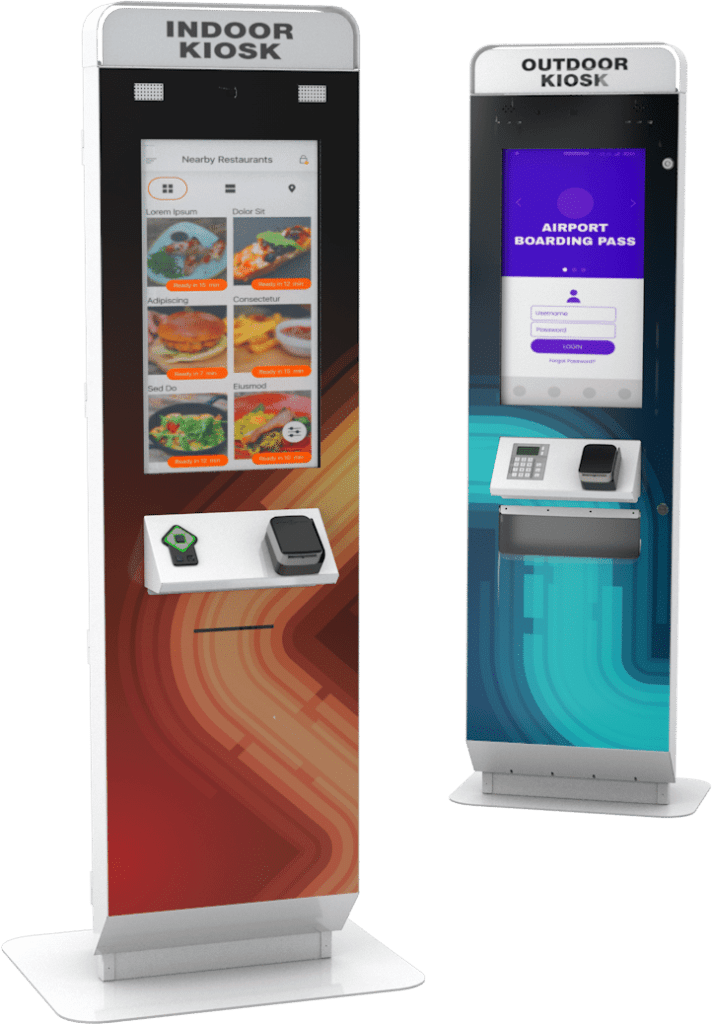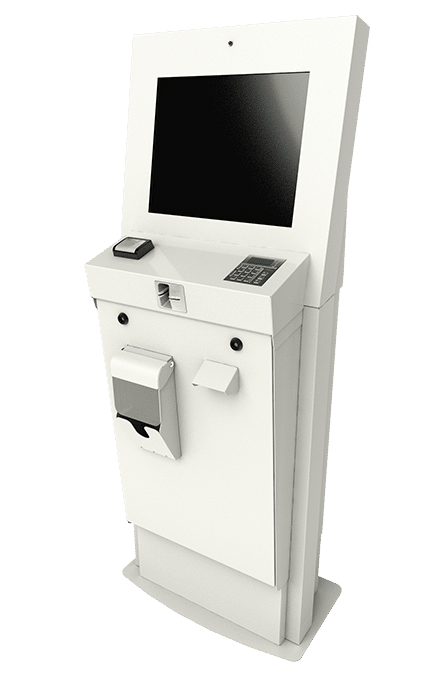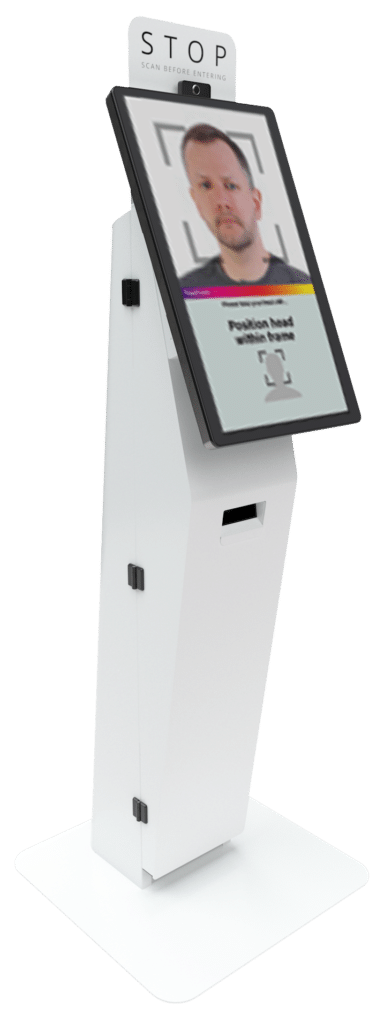Kiosk Cost & Kiosk Price – Your Guide
Terrific article by Olea Kiosks laying out what to consider on self-service kiosk pricing
Want to deploy a self-service kiosk but are curious about the cost? This pricing guide breaks down what to expect.
After deciding to integrate a kiosk program, organizations want to know how much it will cost. To the outsider, this may seem like a simple question. However, there are a lot of factors that go into figuring out the total price.
Kiosks are not a one-size-fits-all product. Companies can pick and choose from various models, customizations, and services. It’s very similar to purchasing a car. Base models come with a standard price tag, but adding any extras—like premium seating, upgraded trim, or a better sound system—will raise the cost considerably. But why do you pay for these added accessories? Much of it depends on the position you want to establish for yourself in the marketplace.
This same philosophy applies to self-service kiosks. Currently, the typical lifecycle of a kiosk is 5-7 years before replacement, however, it really depends on what features and functionality you offer as well as how the technology might be changing the way you do business. What features are must-haves for both you and your target audience? Ideally, a kiosk should:
- Match your brand image
- Streamline processes, ideally for both the user and the operation
- Elevate the user experience
- Fit into the environment seamlessly
- Be aesthetically pleasing
After careful examination, it’s easy to see that not every company will have the exact same wants or needs. Nor will every business benefit from the same self-service kiosk manufacturer.
This guide is designed to educate you on what to expect when comparing kiosk pricing and how to pick which services suit your organization the best.
Universal Kiosk Designs
At Olea, we have several standard or universal designs to choose from. Each kiosk is built on the foundation of fine details and expert craftsmanship, combined with technologically advanced features to enhance the user experience.
Olea Universal Designs are cost-effective for projects with no time or budget for a custom design. They are built with modular components to allow for solution lifecycle management. We have deployed hundreds, and in some cases thousands, of some of these designs, so we can scale rapidly for production and field deployment.
Many of these standard designs have been modified for a variety of use cases. Because of that, it makes them a great option for large-scale projects that just don’t have the budget for a completely custom solution.
Custom Kiosk Add-Ons and Cost
A kiosk can become anything you imagine. Literally. There are so many customization options available that make it possible to design something truly unique to make your business stand out from the competition.
Some enhancements cost more than others. Why? They require more time and overhead to develop. There might be more components involved, premium materials, or additional testing required. Here are some of the hardware modifications customers ask about:
-
Cooling Systems
All kiosks need a cooling system, whether designated for indoor or outdoor use. Types may include an AC unit, fans, or other peripherals designed to maintain a set temperature and withstand the elements.
Some organizations require both indoor and outdoor units simply due to the nature of the facility. For example, a resort in Las Vegas or the Florida coast could benefit from having indoor food and beverage and ticketing kiosks, but they might also want to allow guests to order food and beverage poolside. If the pool is outdoors, they’ll need units that can withstand the temperature fluctuation and if the pool is indoors, they’ll need units that can withstand the humidity and possible splashing that might be experienced in an indoor pool environment. The more complex the cooling system and enclosure, the higher the cost. You can find even more specific information about outdoor kiosk costs and considerations, click here.
-
Processors
All self-service kiosks come equipped with some kind of computer processor. The cost depends on the type of system, size, and capabilities. Going with a lower-cost version may save you money initially, but will you eventually want or need to upgrade to a newer processor? This is something to consider when you are specifying your kiosks.
Consider not only the lifecycle of the hardware but what new capabilities you anticipate the software will require in the future. In fact, the processor required is highly dependent on the software you will be using.
-
Touchscreen Monitors
The size, shape, and functionality of the monitor play into the cost. Larger, more modern monitors cost more than smaller, simplified versions. Sizes vary greatly—from 15″ to 55″. Custom sizes and enhancements will increase the price.
In addition, monitors that will be placed outdoors require different lighting capabilities to ensure users can see the screen clearly on both sunny and cloudy days. These units will also require additional considerations as it relates to the kiosk enclosure to protect the monitor against the elements.
-
Printers
Not all kiosks need a printer, it really depends on what you want the unit to do. And there are different types and sizes of printers that can be used depending on what you need to print. Consider your primary usage and current customer behavior to determine which type is right for your company.
-
Shape and Size
Enclosure upgrades also affect the total price. Similar to a custom home, some sizes, curves, and angles cost more to build. Machines alone can’t make many of the intricate design requests. For example, rounded corners are more time-consuming to make than basic 90-degree angles. These shapes require labor-intensive hand processing, welding, and grinding. While curves and smooth edges can be more aesthetically pleasing, they do add cost to the unit. Also, consider how mobile you want the kiosk to be. In several instances, clients needed to move kiosks around in the field due to traffic being greater or less than anticipated at certain locations. If relocations are necessary, they might require kits from Olea, engineering support, or other support to ensure the relocation is clean.

Other add-ons or design inputs that will increase the total price:
- Enclosure materials
- Upgraded hardware security features like doors, locks, and brackets
- Network connection requirements and security features
- UV-C sanitizing solutions
- Cameras and requirements for lights
- Speakers
- Payment devices
- Custom device mounts
How the Services You Need Affect the Cost
The price doesn’t stop at just the kiosk itself. While additional specific services add to the cost, they also add value. With decades of experience working with large volume customers, Olea has learned a great deal about the typical challenges experienced deploying self-service kiosks, and, as a result, it can incorporate these value-added services.
For many organizations, these services are necessary, regardless of who performs them. But you have to decide if it’s in your organization’s best interest to bring these items in-house or if you want to focus on your core business and have your kiosk provider extend their intricate knowledge and also provide these services. Here are some examples:
-
Ongoing Design and Engineering
Making any changes to the enclosure or hardware system requires an engineering team to design and manage for lifecycle and potential retrofits. In addition to managing UL and other regulatory requirements, hardware and design changes need to be documented so there is a record of all versions deployed to account for network and technology upgrades.
You don’t deploy kiosks in a bubble. There are constant changes with credit card processing requirements, security updates for software and hardware, printers, and hardware that goes end-of-life. You have to be able to account for these things in your succession plan.
Most mid-size companies don’t have an in-house department to handle these needs, nor do they want to establish one. They would rather focus on their core business. Choosing an all-in-one kiosk provider that is capable of design and engineering ensures the same team is always there to troubleshoot and update your units. While providing these services increases the cost to some extent, managing this up-front is typically more cost-effective than managing it after the fact. It’s the pay-now or pay-later scenario and when you defer those costs, it typically ends up costing you more.
For example, let’s say you chose the lowest cost scanning device, but when you deploy it, guests frequently have to make multiple attempts to scan and it ends up increasing guest time at the kiosk. This results in a less-than-satisfactory experience. At that point, not only have your sacrificed customer satisfaction and loyalty, which have hard and soft costs, but you may also need to retrofit the units with a better quality scanning device. It’s far easier and more cost-effective to deploy the right equipment initially.
-
In-House Manufacturing
While using contract manufacturing might make sense for some organizations, it really depends on the total statement of work because it can create challenges for managing end-of-life or technology upgrades.
For organizations that have a steady requirement of kiosks, version documentation is critical to ensure long-term operation and that all kiosks can be retrofitted should the need arise.
Recent supply chain issues have resulted in many organizations wanting to have their manufacturing completed in the United States. This brings significant benefits in managing lead times and logistics. Olea manufactures and assembles all of its products at its facilities in Los Angeles, CA.
-
Dedicated Customer Experience Team
At Olea, customers with a steady requirement for kiosks are provided a dedicated team of project managers that enable additional value-added services. A dedicated customer experience (CX) team member will guide you through the kiosk process, from design to installation and beyond. We have found that providing this kind of resource ensures that both Olea and customer responsibilities are on time and on track.
From time to time, our customers are presented with new opportunities to expand their business. This dedicated CX team member also enables Olea to manage special requests and the potential for change orders in the dynamic world that we know today. If your business model has a need for flexibility and agility, this is something to consider.

-
Supply Chain Management
Olea has long-standing relationships with device manufacturers from printers, PCs, monitors, cameras, etc. because we’ve been doing this for decades.
Hardware doesn’t last forever. Manufacturers continually introduce new printers, monitors, processors, and motherboards. What may work today might not serve you well tomorrow. Upgrading this equipment and figuring out compatibility can take time.
Olea maintains a robust hardware library because we work with a variety of industries and high-volume clients. Because of our relationships, our team has access to new products and technology and continuously vets these devices to ensure a high-quality product to reduce field failures. While this might add some cost for those buying kiosks, many customers rely on Olea’s knowledge and relationships to manage this over having their own dedicated resources.
-
Warranty, Support, and Field Services
Warranty, field support, and maintenance are other cost considerations. Because kiosks are first-line sales for many organizations (theaters, amusement parks, stadiums, etc.), 24/7 support is critical for the revenue stream. Many of these customers will also purchase spares, extended warranties, and support to ensure little to no impact on their business. Warranty and support can be customized to fit your business model.
While some larger companies have the capability to handle this on their own, most mid-size businesses would rather let a professional do it for them.
-
Regulatory Services
Depending on your industry, your kiosks may need to meet specific regulatory requirements. Ensuring UL or ADA compliance is complex.
For some customers, Olea maintains the UL mark on their behalf. As hardware items are upgraded over time, Olea works with UL to maintain and update the UL documentation and track all variations in the field.
-
Integration Services
The Olea integration team assembles the various configurations while maintaining quality standards and cycling products according to the master schedule to meet all client orders in the system. This also allows the integration team to receive updates from Engineering and provide feedback and /or suggestions to engineering for design improvement.
-
Quality Assurance
While all product goes through QA, customized inspection and quality routines can be added to meet specific client needs. For some clients, this includes software installation and testing routines performed collectively with the client.
-
Outbound Logistics
Shipping direct to the site is a benefit not all manufacturers will provide. Olea is able to provide customized shipping routines along with custom packaging and labeling. In addition to providing serial tracking, Olea can also provide storage of finished goods and ship direct. For some organizations, this provides tremendous value as it eliminates costly additional transportation, helps improve time to deployment, and reduces environmental impact.

How Much Does an Olea Indoor Kiosk Cost?
After reading this far, you probably still want a more tangible idea of how much an indoor kiosk from Olea costs. A reasonable ballpark estimate is anywhere between $2500 to $13K, depending on the types and numbers of peripherals used.
Remember that not every company has the same kiosk requirements. You might not need all the bells and whistles and service requirements. The right self-service solution should complement your organization and your business model. We will wholeheartedly admit that if you’re looking for the lowest cost provider, we are probably not the right partner for you. If you’re looking for a high-quality, consultative manufacturing partner, then we should talk.
A Kiosk to Meet the Needs of Your Organization
Olea makes high-quality, durable, and aesthetically-pleasing kiosks for all industries. Our clients are sophisticated and know what they want from a self-service solution. They also understand they don’t want to allocate resources to manage them. As an all-in-one kiosk manufacturer, we take care of all the on-site and behind-the-scenes work so you can focus on growing your core business. Ready to learn more? Contact us to discuss self-service kiosk pricing with our experts.
- BEST PRACTICES
- BILL PAYMENT KIOSK
- BIOMETRIC KIOSK
- CUSTOM
- ETC.
- FINANCIAL
- GAMING KIOSK
- GOVERNMENT AND PUBLIC
- HEALTHCARE KIOSK
- INSPIRATION
- KIOSK APPLICATIONS
- MALWARE KIOSK
- OLEA KIOSKS IN THE NEWS
- QSR AND FAST CASUAL DINING
- RETAIL
- RULES, REGS AND CERTS
- TICKETING KIOSK
- TRAVEL AND HOSPITALITY
- WHITE PAPERS